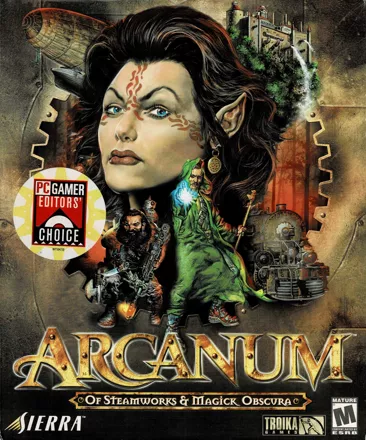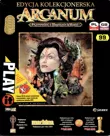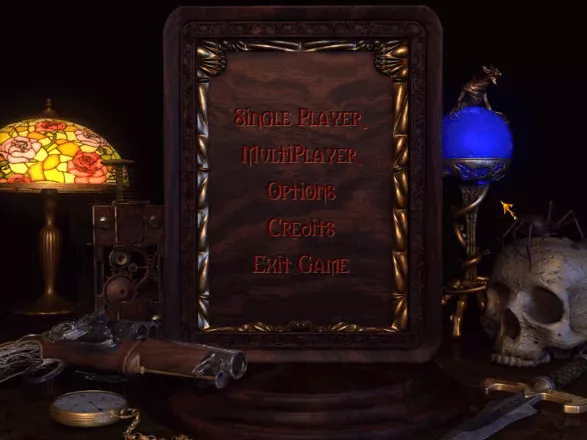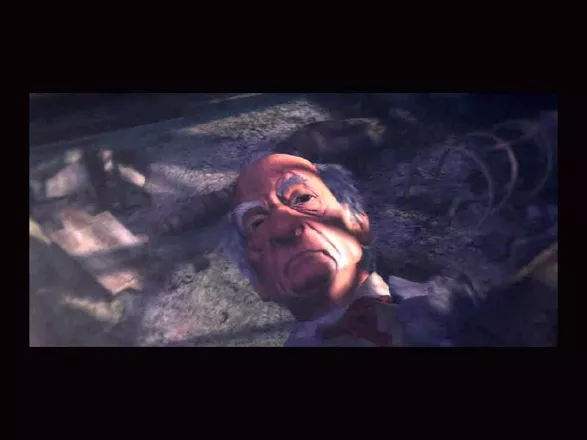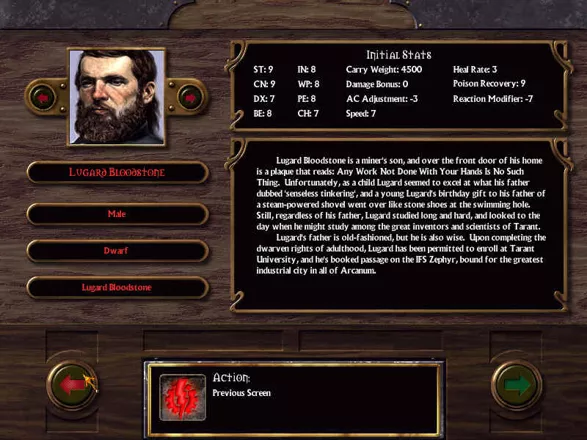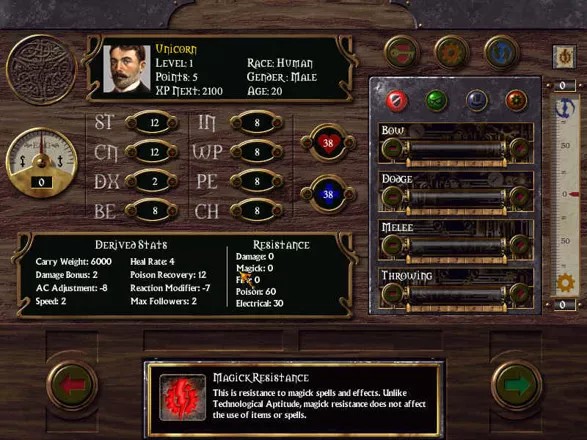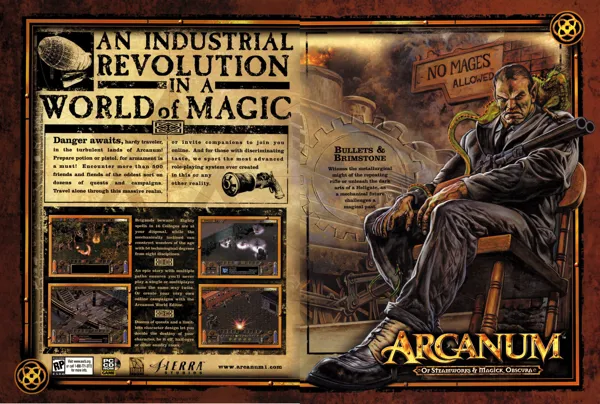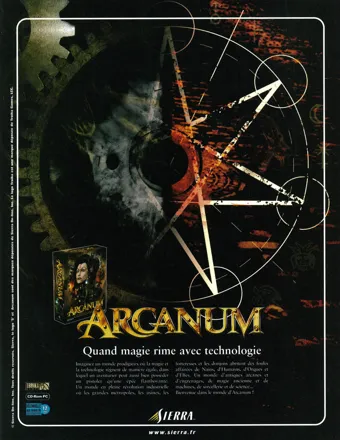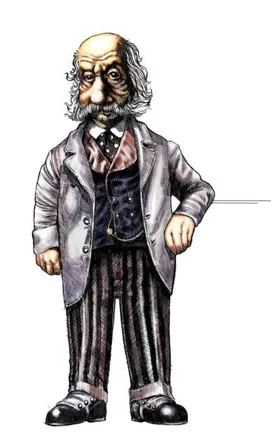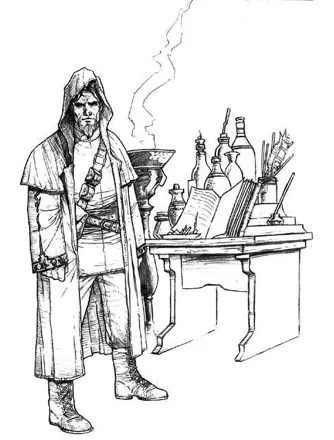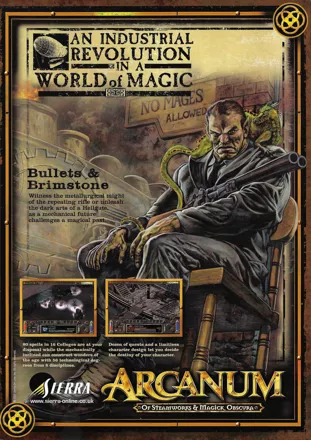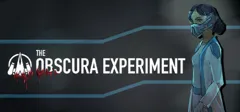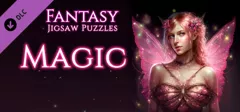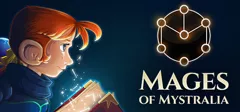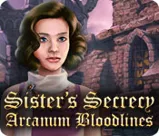Arcanum: Of Steamworks & Magick Obscura
Description official descriptions
The luxury zeppelin IFS Zephyr begins her maiden voyage from Caladon in the Kingdom of Arland to Tarant, one of the largest cities in the technologically advanced Unified Kingdom. Suddenly, while the zeppelin is cruising over mountains, two monoplanes attack it and eventually shoot it down. The two half-ogre attackers die in flames along with all their victims except two who miraculously survived. However, one of them, an old gnome, is mortally wounded. Just before he dies, he gives a silver ring to the other survivor and tells him to "find the boy". The witness of the crash, a man named Virgil, declares that the now only survivor is "The Living One", a reincarnation of a deity, and offers to follow him wherever he goes. The hero begins a long and perilous search for the mysterious boy, the origins of the silver ring, and the unknown enemy who was behind the attack on the zeppelin.
Arcanum is a role-playing game similar in concept and many gameplay principles to Fallout. It is set in a unique world, which can be described as mixture between Tolkienesque fantasy, steampunk technology and elements of British and North American culture of the 19th century: dwarves may carry molotov cocktails, and a half-orc protagonist can travel by train between Victorian-like cities. Magic and technology are opposed to each other; most humans and dwarves embrace technology, while some elf clans stick to the old ways and consider scientific progress evil.
In the beginning of the game the player creates the main character, choosing from a variety of races, attributes, magical or technological disciplines, social skills, backgrounds, etc. When the character levels up, the player can increase his main parameters as well as any available skills. Like in Fallout games, the player directly controls only one character; however, companions who join the party may be given orders, and their inventory can be managed by the player.
The game is open-ended: the player is free to explore the vast world from the onset, undertaking a large amount of side quests or following the main story. Social interaction plays a significant role: depending on the player character's charisma and intelligence attributes, as well as persuasion skill, many problems can be solved in a non-violent way. The amount of companions willing to follow the protagonist also depends on the latter's charisma rating; companions may also leave the party if they disagree with the hero's behavior.
The player can select one of the three combat modes for the game: real-time, turn-based, and fast-paced turn-based. Turn-based mode is similar to the combat in Fallout games: characters require action points to move, attack, or cast spells.
The game includes an editor called WorldEdit, which allows players to create their own maps, campaigns, and non-playable characters. Objects from the base game can be carried across to the player-created scenario. The scenery editor allows players to create their own objects. It is also possible to set and change game variables, i.e. the amount of skill points required to perform a specific task.
Spellings
- 奥秘:技术与魔法 - Chinese spelling (simplified)
Groups +
- BestSeller Series (Cendant / Havas / Vivendi Universal) releases
- Fantasy creatures: Dwarves
- Fantasy creatures: Elves
- Fantasy creatures: Gnomes
- Fantasy creatures: Halflings / Hobbits
- Fantasy creatures: Orcs
- Gameplay feature: Alchemy
- Gameplay feature: Brothels
- Gameplay feature: Character development - Skill distribution
- Gameplay feature: Gambling
- Gameplay feature: Karma meter
- Gameplay feature: Multiple endings
- Middleware: Bink Video
- Physical Bonus Content: World Map
- Protagonist: Female (option)
- Sound engine: AIL/Miles Sound System
Screenshots
Promos
Videos
Add Trailer or Gameplay Video +1 point
See any errors or missing info for this game?
You can submit a correction, contribute trivia, add to a game group, add a related site or alternate title.
Credits (Windows version)
157 People (118 developers, 39 thanks) · View all
| Project Leader | |
| Lead Programming | |
| Programming | |
| Design | |
| Animation | |
| [ full credits ] | |
Reviews
Critics
Average score: 79% (based on 61 ratings)
Players
Average score: 4.0 out of 5 (based on 168 ratings with 13 reviews)
The Good
This review is long. I apologize; I didn’t intend to waffle. If you decide not to read this because of its length, I perfectly understand you, and probably would immediately join you for a beer. But for the sake of my favourite genre, role-playing games, I have to explain in detail the errors of Arcanum. Because they are legion, and because they are fundamental. And now that you’ve made it this far, you could actually go on and read the whole text.
The Bad
Know this then: Troika Games consists of the people who created Fallout. Fallout was, and is, one of the most perfect role-playing games ever designed.
It is important to know these two things to understand the scope of Arcanum’s failure. Because everything that Fallout did right, Arcanum does wrong. On the plane of consciousness on which the game was created, which is certainly not our own, this might even be some sort of achievement.
Arcanum is not a bad game. In a certain respect, I wish it were; you can feel pity for the cripple, but a bore moves no one. As it is, it is hard to understand how Troika could have the cheek to publish a game that is so obviously outdated without making absolutely, perfectly certain that there is a healthy body under the rags. Instead, the garb covers a slip of a game dragging itself along.
Enough grumbling already. Let’s hear the facts.
I will never tire of stressing the brilliance of the Fallout skill system; in my book, it can hardly be improved. Arcanum exemplifies this point nicely, as they tried. To be fair, Arcanum’s skill system is still its strongest point; the specialization works reasonably well (although the game not nearly enforces it well enough), and the tinkering with technology is great fun. However, Troika confused quantity for quality and bred confusion. The problem is really simple: you have so many choices that you cannot decide on one. This might be called freedom, if it wasn’t for the game’s lack of guidance. You can only guess which skills might be useful; in fact, many aren’t at all. Any master gamblers out there? More: Why is there one point for all talents? Fallout showed how a wise structuring of skill areas can greatly improve comprehensibility. Why must the basic skills be changeable? That makes your character a wobbly turncoat instead of a clearly defined specialist. Why do Arcanum characters level up so frequently? This greatly diminishes the overall importance of levelling. If you play Arcanum and understand why freedom is not always a boon, the game may have a purpose after all.
Arcanum is the Might & Magic of 2D role-playing games: lots of insignificant quests, almost insulting in their stupidity, piling up like trash along the main road. I have nothing against a variety of challenges, but I demand exactly that: variety and challenge. At best, I hope for side-quests that arise naturally out of the game world and are motivated through the plot. Look at Baldur’s Gate 2, for example, where the desperate need for ransom money forces you to do menial tasks, or where you are – brilliant idea! – unexpectedly offered quests that concern one of your party members. Disappointingly few of Arcanum’s quests are sensible in this way, even less are remotely interesting.
Even worse, this is also true for the dungeon mission, regardless whether they are plot elements or not. Sad highlight is the Tarant sewer, an endless maze of blue-grey tunnels in which the designers threw in monsters at random, but forgot to throw in some sense as well. Even the randomly created dungeons of Diablo are more varied (and a lot more thrilling) than the hand-made corridor deserts of Arcanum. Pinch me, maybe I’m ungrateful. Probably it’s asked too much that dungeons are exciting, and an extra dose of enemies always makes up for the lack of those other things, wosname… puzzles.
You might not have noticed, but you have companions. Yeah, the guys that join your group until the next fight, when they die. Party members can be a great utility to increase a game’s depth. Take a look at Baldur’s Gate 2 once again to see how gripping a cleverly designed party can be. But try and answer me this question: What good are the companions in Arcanum? Please, this is serious, think! My little brother has put it perfectly in one word: packhorses. They carry around extra stuff. That’s all. And that’s sad. Generally spoken, companions could, and should, serve two purposes: contribute useful additional abilities to broaden the choice of actions, and enrich the atmosphere. The second job is more important and generally paid less attention. The Arcanum companions serve neither purpose, as their talents are of little value (Virgil has not opened one single lock successfully for me, Magnus can build utilities that I don’t need, and so on), and they follow you around speechless like zombies, when they could enhance the atmosphere so much by commenting on each situation, quest or person -- a huge chance wasted. If a game feature is useless, then it should either be improved or removed.
Oh, the fights. I cannot help but think that Troika would have preferred doing without. The battle system of Arcanum is, well, functional. It serves it purposes, i.e. killing evil guys. Sorry to insist, but I have another question: Why do you fight in Arcanum? I believe there is an answer to this question on a general level, but it doesn’t apply to Arcanum or to many other games. Somewhere along the line of RPG creation, the purpose of battles must have been lost. Fights should first and foremost be challenges. Tactical challenges. A good RPG fight is always a matter of superior intelligence against superior strength. Only then can a battle be thrilling and rewarding. It doesn’t matter whether the strategy is correct use of weapons, spells, formation, action points, timing, you name it; what matters is that you can use it, and that you can win by using it correctly. The Fallout fights were tactical in their use of action points, weapon choice and targeting system; no surprise that they were refined into a full-fledged strategy game (Fallout Tactics). In Arcanum, battles serve only the two lesser purposes: as obstacles and delays (a use which sooner or later exhausts the players’ patience), and as a means of acquiring experience points. Hey, think hard, was there a memorable fight in Arcanum? On second thought, don’t strain your memory.
If you played Arcanum, you probably know that there is a skill cap at level 50. I find the necessity for caps dubious on principle, but in Arcanum it is actually understandable: Your hero simply grows too strong too fast. This is only one of the effects of bad balancing. There are many more. Take the plot, for example. Actually, the story of Arcanum could be quite interesting. Unfortunately, it is stretched so thin over the first half of the game (up to the Isle) that it hardly moves at all. Especially in the beginning of the game, a fast pace is essential to wake and bind the player’s interest. In short: things need to happen. In Arcanum, things happen very, very slowly, and those that do are not really thrilling (“Oh, you found me! Now search that mine”). So, the plot would have needed tightening. Also, as a friend of mine pointed out very rightfully, the program does nothing to encourage a decision for either magic or technology. Again, don’t mistake that for freedom. A strong, early opposition of forces would not only create dramatic tension, it would also increase the replayablity a great deal -- after all, you’d like to see the other side, too. But again, a chance had, a chance thrown away.
Lastly, and most importantly, there is the issue of technology. Mind you, I can live with Arcanum’s graphics, even though I feel that sting when I look at the other games on the store shelf and the 40 bucks in my hand. But what I cannot live with is the game’s speed. In fact, to publish a game that looks like a mid-90’s relic and jerks like a slide show on a PIII is an unbelievable impudence. I don’t know what technical challenges the programmers faced, and I don’t care; I expect a working product for my money. If a TV salesman told me “Did I say constant viewing? Well, it shows static every few seconds, of course”, he’d see static for more than a few seconds. This technical botch-up is not only unnerving, it is also a genuine mood-killer; if the screen is drawn once a second, I can no longer enjoy the illusion to explore the exiting city of Tarant, but I am constantly reminded that I’m sitting at my desk and staring at a computer.
Thank you for your patience. If you were clever, you scrolled down directly to this paragraph in expectation of a summary. Here it is: Arcanum is a mediocre game in every respect, as it disregards basic guidelines that every game, especially role-playing games, should follow: pace and flow, guidance and soft pressure, depth without confusion, atmosphere and credibility, and especially, meaning. Meaning in a computer game? Not in the philosophical sense, not necessarily. But in a down-to-earth, every-day sense: telling the player what he has to do, and why. If there is meaning, what follows is motivation.
The Bottom Line
A huge disappointment for RPG fans, Arcanum tries to fly to the stars with a wooden rocket. Compared to Fallout, Arcanum is not one step, but a fair afternoon walk backwards. How on earth this could happen is beyond me; if anybody knows and is willing to tell, he could restore a distressed man’s sleep.
Windows · by -Chris (7762) · 2001
An engrossing and impressive rpg that ultimately lives up to it's potential.
The Good
There's a lot to love about Arcanum, it's the first rpg to come out from the runaway splinter group of Fallout's developing team, and suffice to say that the pedigree shows.
The game provides a truly engrossing experience, in a completely unconventional setting, with lots of rpg-ing goodness and a wonderful character editing system.
Truly the game's strongest point is it's world, it's a mixture of traditional fantasy elements with a strong "steampunk" edge that makes for an incredibly unique gameworld (sort of like "Thief meets The Difference Engine"). A gameworld that is populated to the max with npcs, quests, and places to explore. This of course takes the focus off the main plot, but as long as you understand that, that half the fun in Arcanum comes from exploring and fooling around at your leisure, then you'll be okay. Arcanum appeals to those types of players that want to experience a game from end to end, not just 1 (one) adventure in 1 (one) setting. If you want everything tied up nicely with the main plot then you are barking at the wrong three. The game has millions of sidequests that both enrich and liven up the experience (if you are willing to put the storyline in the back-burner for a while) in fact, few games take you off the main plot to explore an X-files like conspiracy or have you solve murder cases, negotiate political treaties, or lots of impressive quests like the exceptional one with the fortune teller early on....Granted, the game has a bit of "filler" material, but it's nothing compared to the amount of innovative and truly interesting quests it has in store. And the story itself even though is starts out rather bland, gets way better as the game progresses, with a lot of good twists and situations.
The npcs that can be added to your party come in a nice variety, and add a lot of color to the game, they add info and comments on locations and have their background, motivations and will add their own participation to the storyline. Only a select few have this however (tip: choose the talking ones! ;)) and they don't add as much color as in other games like Baldur's Gate, but they bring a lot more to the game than more inventory space and fighting muscle. Whoever says they are merely packhorses hasn't taken Magnus around, or left Virgil early on in the game, didn't take Z'an A'zul Rhin (or whatever!!) to Arronax, left Raven to rot in Quintarra, or didn't even bother to check Torian, etc...
Another highlight of the game is it's powerful character editing system... Which again, will piss off players that have little grasp of what they want. I'm not calling myself an expert in this types of games, but I have seen newbie rpg friends stare blankly at the screen trying to figure where to put their skill points. One must certainly know what he wants when he creates his character, and must be prepared to steer him in the direction that matches his playing style. As in other skill-based rpgs like the Fallout games, the character evolves continuously, and is not limited by a particular class. However the character system in Arcanum goes a step further and in some aspects even surpasses Fallout's S.P.E.C.I.A.L. system. For starters it's based on points, which as even the remaining Black Isle developers admitted, works a hell of a lot better than Fallout's percentage system. You could sometimes add 15% to a skill and nothing tangible would happen, you always had to raise the percentages above certain "milestones" to get stuff to happen (say, 50, 70, 100, 150, etc.). On Arcanum you get a small number of points to add to any skill, but said points ALWAYS make a difference, so needless to say there's a great feeling of reward for every point earned, not to mention that you have considerable bonuses for excelling on each skill like being able to buy worn items, get any npc in your party regardless of alignment, etc.
Furthermore, the game allows you to put points into your basic skills, which is to me, another great choice. The lack of that option in the Fallout games placed you in a shell you had no chance of getting off in the game, once you assigned your points, it remained forever etched in stone for the rest of the game... effectively thrusting you in a class of sorts, a class made by you, but a class in the end. Sure, this system only works if you like this kind of freedom, but even if you don't Arcanum comes with lots of pre-made characters, and an auto-level up scheme which simplifies the whole process.
On the technical side of things, the game comes with a great soundtrack and good sfx. The graphics are dull at times, but they are functional enough. Oh, and for the millions of geeks that keep bugging about the lack of a decent viewing area, I should mention that my copy came with a big Arcanum FULL SCREEN start icon... I suggest you guys try it!
Oh, and you also get a multiplayer mode, an editor, and the chance to play mods! How's that for more player value?
The Bad
For starters there's the fact that the game has serious performance issues. I am well above the recommended system requirements and even so I experienced stuttering, and choppy animations... next time add some 3D stuff guys, if only to take advantage of hardware acceleration...
Also the cutscenes in the game are exceptionally well made, but are veeeery scarce. In fact, there isn't a real ending movie, and there isn't a proper epilogue to your adventure, just a rundown of how you affected each location and character in the world, which is a nice touch... but it's not an ending sequence!!!
Other than that there's the issue of fights and experience earning. The fight system is rather good, it offers a significant amount of options without becoming cumbersome and allows for an interesting set of options, I for one think the addition of a fatigue system works great, since it forces you to keep an eye on what your choices are. Unfortunately you have little to no control of your party members in combat, you can order them to stop or start attacking, but that's about it. Mind you, they work a hell of a lot better than in the Fallout games (whoever says he didn't cross his fingers and clench his teeth whenever any party member whipped-out a smg or minigun is lying his ass off!) but they still have weird quirks. The weapon selection is always weird ("ok Virgil, so you are telling me that Broadsword you can't even handle is better for you even when I'm giving you a filament sword??") and the AI on both opponents and allies is questionable at best. Your friends will take the most weird and stupid routes to get to their enemies, and they will make use of their most powerful spells in completely absurd situations. Ditto the enemies, whom most of the times I just tricked into targeting and following me (keeping out of his reach), while the rest of my party kicked his ass to his seemingly complete ignorance.
Regarding the exp. issue, the game has adopted a weird system. You get experience when you kill monsters, but also when you hit them!! Needless to say, you get very strong, very fast, and while in a decent town you will probably level up once due to the quests, in a typical dungeon you'll go 3 levels up minimum!
It sure is nice to feel that you are always moving forward, but your character does get VERY strong VERY fast, especially if you do the altar quests. Memo for Arcanum 2: Fix up the exp. balancing.
The Bottom Line
A truly unique rpg that stands on its own, and even surpasses it's predecessors in some accounts. An interesting question was risen in a previous review, does Arcanum have a meaning? Yes it does, but not in the "You have to go and do this" kinda way. Arcanum's meaning is "You just got dropped on Arcanum. Enjoy yourself" :)
Completely engrossing and fulfilling, Arcanum is truly a landmark in the genre of crpgs, a game that sucks you in, and gets you lost in a brilliantly crafted world.
Windows · by Zovni (10504) · 2006
The Good
Arcanum was the first game made by the now dead company Troika. You know, the company founded by the famous trio behind Fallout.
What I liked about Troika, was that their games had this we-made-this-game-for-the-sake-of-just-making-this-game feeling to them. They weren't shiny, polished, 2 and half choice, above average storyline, romance novel characters games.
They were more gamey, flawed, humbler, yet more ambitious in some sense than Bioware's games for example.
Arcanum follows the Fallout school of game design. That means you can almost play any character you want. For example: a handsome "I'll talk my way out of this situation" human male or a dumb half-ogre with a kind heart who sprouts lines like "Flowers!!! They be pretty....ooh, butterfly!", or even a sexy half-orc female mage, who sold her soul to evil and delights in destruction and letting herself be abused my males and then kill them.
Sidenote: there are few scenes when you are a female character and when you want either to survive or get into some club you have to kiss someone's feet or have sex with him.
Aside from the larping stuff (the stuff that only happens in your head, and we don't judge the quality of games on that) the game really allows you to play in anyway you want.
But now to the most important detail. Choices and consequences. You can make choices in this game. I like choices. It respects the player. It makes me respect the game. Respect, Game.
tiny electronical voice: ...respect man....
Bob the Imaginary Gaming Friend: "Nice to see you holding your grasp on reality so well."
Well I think it's great when the game allows you to make choices, and also provide you with shitty consequences rather than hold your hand always and lead you safely through itself. Also shitty consequences is not the same thing as an unfinishable state. They just spice "choices and consequences" with certain element of realism and danger.
I actually would like to tell a little story that I just now remembered. It happened five years ago, in my first playthrough.
You see, somewhere in storyline you need to sail onto some distant island, and when you do get that far you need to get a ship to sail. And how do you get a ship? Well you could buy it for a very large amount of cash somewhere in tens of thousands (I only had like 500) or you could get one from an undead pirate called Pete.
Bob: "Now that's a brilliant name for an undead pirate."
Anyway there are three ways to get the ship from Pete, gamble for it (unfortunately I didn't find gambling skills important early in the game so I had not invested any points into it), kill Pete for the ship, which I tried but couldn't beat him since my character was built as a diplomatic character...
Bob: "Diplomatic character who doesn't have any gambling skills? Isn't that like an oxymoron?"
... or do three quests for Pete. Well what happened was that I screwed up one of his quests, I don`t remember how, but I do remember the fear that I was not going to finish the game and that all this was for nothing. So there I was, doing sadly some quests for some gnomish politician in hopes of earning some cash, when another gnomish guy comes to talk with me. He offered me a job as an assassin and the amount of cash was just what I needed. I remember this because I had serious moral issues with this quest, you see back then I played myself in RPG's, or at least an ideal of myself - a weak in body, charismatic, very handsome, unbelievably sexy and intelligent male with a kind heart.
Bob: "Oh God! That just screams white and nerdy to me."
He wanted me to kill the King of Caladon, it was purely political and purely for money, so I couldn't justify myself (if he would have said that kill the king because he rapes virgins then I would have had no issues with it), but I wanted to finish the game badly. So I did it, back then I felt that part of me died, that I lost my blood innocence, that I sold my soul to Devil and there was no redemption for me (I was fourteen at the time); nowadays I can walk and kill everyone on sight in games with no problems at all. That quest itself was greatly designed, with lots of sneaking and backstabbing... I mean how many quests from games do you remember after four years of playing it?
Bob: "And what was the point of all this? Memories of a gaming veteran? Oh, please!"
I thought it would be a lot better to illustrate the gameplay of Arcanum rather than trying to describe it.
And now I would like to talk about the other major brilliance factor for this game, it's atmosphere.
It's steampunk!!! Not steampunk like in the sense that Thief 2 was steampunk, and not steampunk in the sense that the dwarf has a gun, but steampunk like a 19th century Victorian England.
Bob: "And of course the dwarf does indeed possess a gun."
Everyone duck, the dwarf has a gun!!!
Bob: "That was lame."
Ah, I'm killing myself here. And of course the music, composed by Bill Houge and possessing a very 19th century feel, was a major contributor to the atmosphere. It wasn't always to my taste, but I have to admit that without it the game would have lost something. So kudos for Bill for composing a music closely tied to the style of the gameworld.
Bob: "I personally liked the newspapers, and the whole design of stuff that you can use in some way or another. You know, stuff like "Mom's Beans" cans and... the whole ambiance is great. Nothing wrong with that. The in-game books are also written in that 19th century way. Just great. And I can't believe that you, being a voice-acting buff and all, haven't mentioned Rino Romano yet."
Oh yes, the voice-acting. It was great. And Rino Romano's role as Virgil was great, because Virgil was the eternal companion (though optional) to the player and he grow and changed the most in the game. And of course, other voices were great to, unfortunately their characters were not that memorable.
And now something completely different...
The Bad
Arcanum is an open-ended game with a big world. But an open-ended game must keep the player interested. A big world might just turn out to be big island with lots of no-names (Morrowind for example). So how does an open-ended game with a big world maintain the players interest? Artsy main story about
the nature of the man? No, not really, Planescape style doesn`t really work in a game like Arcanum, Ultimas 5-7 or Fallout. Interesting writing then, stylish presentation of dialogue? Yes, for example. And here we come to the first problem.
While Arcanum does indeed possess nice dialogue, but it's all style and no substance. The npc's in this game have no life.
Bob: "That sounds kinda hypocritical since you have no life either."
They seem to exist for the sole reason to give you quests or being obstacles before your path that you either kill or persuade. Everything they say is somehow involved with you. And when you gained what you got, there's no point in talking with them more. Especially considering the fact that some even don't have the dialogue tree after you've done with them. Let me give you an example. Here Bob, I need your help for this one.
The player character meets an npc, quite fittingly named Bob, before getting a related quest.
Bob: "Hello, nice weather we're having.
PC: "I must depart now."
The player character meets Bob after getting the quest.
PC: "I heard that you might know the whereabouts of Bla-bla?"
Bob: "Bla-bla? Yes that name does ring a bell, but I'm a businessman and I would be a poor businessman if I would freely give away such information.
If the pc persuades: "You are THE businessman Bob?!!? I'm your biggest fan. I have every one of your books: "Why good girls like rich fat men.", "Money and ethics", etcetera."
Bob: "You liked them?!! I mean of course you liked them, I am after all THE businessman Bob, ha-ha-ha! (I'm really enjoying this acting stuff) Hey, have you heard that story when I bought a dwarven kingdom with two broken shoes?
Then Bob rambles on, he gets in a good mood and gives you what you want for free. Now if you don't have enough persuading skill, then you must do a quest for him. Of course you can always kill him. If you gained what you want and then later come back to talk with Bob he'll only say something like "Nice to see you again, friend."
Now the dialogue is nicely written, but every single npc that is talkative (which means that you can have more than 2 responses with them) is related to some side-quest or another. And when you didn't have quest involving that npc then you couldn't talk to him. These npc's have no life, they are not real characters, they are obstacles that the player must overcome. And thus every sort of dialogue was oriented around the player. Which might be ego-boosting for some people, but for me it robbed the world a lot of detail. This game really needed some NPC that would be part of the world, rather than being part of the quest. Big worlds must have a sense of reality to it. Shallow npc's won't help with that. It made world feel empty.
Bob: "Actually, it's not that different from Baldur's Gate series."
My personal opinion is that Arcanum is a far better game than BG1 so I won't comment on that, but BG2, also an open-ended game, maintains the players interest with fully fledged-out party members, their conflicts with others and of course romances also. It gave the game an adventure novel feel. And what about the party members in Arcanum?
Most of the joinable characters fall into shallow category, Only party members that were worth taking were the voiced ones. And even those were kinda bland. For one thing, you really don't talk to them when they are in your party (you ask questions like "Can I look your inventory?" or "What do you know of this place?") and they don't talk to you, you talk to them before they join and they talk to you before going into the Void (the endgame part). It is somekinda weird mix between Fallout's and BG's way of interacting with party members.
Bob: "I just have to mention it, that everything you put as fault to casual npc's and party-members is done in Virgil."
Yeah, but having one npc doing all the character arc's and world-depth is too much for one character, voiced by Rino Romano or not.
Also another thing. Arcanum has some form of npc schedules, but they are primitive compared to Ultima 7. It seems that only shopkeepers and those npc's that you can steal from have time schedules and it looks like this: in the morning he or she gets up, stands in one room for 16 hours and then goes to the next room to sleep. Brilliant, eh?
Bob: "Well to be honest, the only npc's to have schedules are the ones that are involved in the thieves guild quests."
Yeah, but those quests were horrible. You get the person's name and object you must steal. But why does Cedric Appleby keep a Sword of Derian-Ka in his safe, or why does Fitzgerald own a Potion of the Darkest Evil? There's no reason for those things to be there. It's just fed-ex in it's vilest form.
What else can a open-ended game do, to maintain players interest - Background detail? Yes, Arcanum's background detail was very good. As Bob mentioned, many of the books were nicely written, newspapers were fun to read. But, everything that was talked about in books, every historical incident, the player most probably met all of these things. It caused the effect that the world turns around the player, it made the world seem small and without life. Again, to make a big world, have some background that the player won't experience himself, it makes the world look more alive. Like in Baldurs Gate or Morrowind, there were books that described events which the player had no chance getting involved with - the world had history. Or Ultima 7 where there lots were of fully detailed characters that did not have anything to do with the main story or side-quests - the world had life. Arcanum does neither of these.
Bob: "A game can still be good, if it doesn't do things like that."
But Arcanum flirts with those things. Arcanum does some primitive npc schedules and flirts with history, but when you dig deeper, it all falls apart.
And then the mystery plot. The plot did it's job when it kept most things secret (like most of mystery stories). Of course it jumped from one thing to another like a Dan Brown novel and is about on the same quality. But what really bothered me was, that after meeting Nasrudin, everything just fell apart. The revelations were too big, and since the player already has met all the historical character described in books, and when it comes around that everything and even the industrial revolution is related to the Big Baddie and the player... well it shattered the final shards of illusion of the world and made it look like someone's playground. And the final revelation was the worst one of them all.
The player meets the big Baddie.
Bob: "Can I play the Big Baddie?"
Sure, but I gotta warn the reader, that there be spoilers following.
SPOILERS START.
Player: "Die, big Baddie!"
Big Baddie: "No, I am not the big Baddie. He is!"
Player: "Okay, sorry! Wanna join my party?"
False Big Baddie: "Okay."
The player and the fake Big Baddie unite and go together to kill the real Big Baddie.
Player: "Sayonara, you big Baddie!"
The Real Big Baddie: "No, wait a minute. I must tell you why I am the big baddie."
Player: "Okay. I guess I can spare a moment or two."
The Real Big Baddie: "You see, when people live, they choose evil and kill and rape each other. They hurt each other. They die. And go to Hell. But what if I killed them all?"
Player: "Umm... I guess they would die. And still go to Hell."
The Real Big Baddie: "Oh, I didn't thought about that. My mistakey. Sorry. See ya!"
Player: "See ya!"
SPOILERS END.
Okay, the dialogue itself was written with more style and depth, but it really felt like that. There wasn't enough foreshadowing for the real big baddie, so he really felt out of place. Villains should have more presence in the story. He just jumped out in the last moment.
Bob: "His name was mentioned couple of times in some historical books."
Yeah, I already complained about how the player (if he is as obsessed in discovering all the secrets like I am) can meet every historical character and find every historical secrets mentioned in the game.
Bob: "The thing is, in a way it shows Arcanum's brilliance."
What you mean?
Bob: "Well, I've been patiently listening here to your complaints. And I must say that they are unfair. The good thing is that you have stayed away from the typical cliché's of Arcanum reviews - which are focusing just on bugs and the lousy combat. But you still pick only on couple of parts of Arcanum - the game world feeling kinda fake and the boring party members."
I'm not really following you here.
Bob: "You see, you're only criticizing the parts that to you are the essence of roleplaying games. But that's the biggest mistake to make with Arcanum. Arcanum, in it's very core, does everything that that people might associate with the word RPG. So you just can't pick on few details, because Arcanum isn't that kind of a game. Arcanum is an ambitious project and... well let's take a look at character creation for a moment: you can create any character you want (sex addict, inventor, gun-slinging adventurer, an elven mage with big boobs, etc.)
Now most games just end there, but Arcanum allows you to play any way you want.
Want to go hunting for historical artifacts and treasures - sure, check in the library, search in the ancient manuscripts and go all Indiana Jones on ancient burial grounds.
Want to just hack and slash like Diablo - sure, turn the real-time combat on and slaughter entire cities.
Want to kill anything you see and still be able to finish the game - sure, see the Diablo thing above.
Want to have tough moral situations a la Ultima - sure, and you are not forced in the role of reverend Eric Camden in fantasyland this time.
Want to have npc drama and romance a la Bioware - sure, the elven chick and Virgil embody that design.
Want to play this game without having any combat at all - yes you can, sure it's hard and requires deep knowledge of the game, but it's possible.
Want to have choices and consequences and branching storyline - sure, every quest has multiple solutions and outcomes and the evil and good paths of the game are strikingly different from each other (evil one being the more simpler one also).
Want to experience the legends and stories of the world - sure, books and and some npc's (and there were couple of guys, who were just there for giving the world some depth... well just one, but still) talk about the history and political tensions of the world. The last ride of the knights of Dernholm was my favorite piece of lore.
Want to experience a Japanese rpg like story with heavy philosophical themes - sure, just play the damn thing.
Basically, Arcanum does anything that a person calling himself a roleplayer, from whatever niche he is from (choices and consequences, story, combat, exploration, etc.) would find the things he wants from the game."
Wow, if you put it that way. That is pretty fucking awesome. Wow.
But, it does all this things worse than the games designed for these niches alone - hack and slash being disappointing for Diablo fan, story being disappointing for the Japanese rpg fan (cause it lacks emotional drama), romances being disappointing for Baldur's Gate II fan (cause there's not much else beside the sex in the romance), the world feeling fake for fans of Ultima 7 and Morrowind.
Bob: "Yes, Arcanum doesn't do some of the things as great as the games individually designed for those particular niches. But, in it's defense I must say - Arcanum is the only RPG that combines everything associated with the word RPG, and it kicks the living daylights out of Fallout with it's choices and consequences."
So, I'm a dumbfuck?
Bob: "Yes, yes you are. Just because Arcanum didn't deliver on things that for you are the most important element in roleplaying games, doesn't give you the right to dismiss it without taking into consideration the ambition behind the game - which was one step closer to The Ultimate RPG. And in this case the ambition is great enough to ignore the faulty design."
The Bottom Line
Bob: "Anyway, bottom line, Arcanum is a faulty game. But it's one helluva game. And while it's not perfect, it's one step closer to the Ultimate RPG design. It's so ambitious that I can't just help admiring it. True it might mean that I appreciate the design of Arcanum more than the actual fruition. But I think it would be sad if Arcanum would be forgotten, since it shows that a thing like the ultimate rpg can exist."
Wow, I had no idea.
Bob: "And you even forgot to mention that Arcanum has one of the greatest optional side-quests ever ;)."
But to who would you recommend the game then? The way I understand is, that despite Arcanum being one step closer to the idea of the Ultimate RPG, it's still only manages to be enjoyed by people heavily interested in theoretical interactive media design.
Bob: "You could be right, but it's the people involved in game design who are doing new RPG's, and in RPG design Arcanum is very educational. I don't care what you say, but I'm not allowing this game to go with any grade lower than 5."
You need to have one of them final quotes also, just like in them professional reviews.
Bob: "Arcanum is an ambitious RPG, and while it has a lot of flaws, it's one step closer to the ideal of the ULTIMATE RPG and it would be a shame if this game would be forgotten."
Well that's nice, but I'm going to ignore you now. It's not nice to hijack my reviews, even if for a good cause. The design might have been ambitious, but the final product didn't satisfy me. So I can't give it the praise you have given. But I will take this new information into account when rating the game.
So good-night the mysterious voice inside my head. Now leave me alone with my booze to ponder on important thoughts about games.
Windows · by The Fabulous King (1332) · 2008
Discussion
| Subject | By | Date |
|---|---|---|
| [false alarm] glitch: no speech? | Rola (8485) | Oct 20, 2018 |
Trivia
Graveyards
A hidden graveyard, containing tombstones of Arcanum's most diehard fans, can be found at the location W: 1060 S : 809 on the world map. Another graveyard has lots of humorous epitaphs written on the graves. However, many of them are taken directly from Baldur's Gate.
Manual
Following on the tradition started in the Fallout manuals, Arcanum's manual includes an actual cooking recipe. This time it's Grandma Cookhill's Three Bowl Bread.
Mod pack
On 7 January 2002, the development team released a free mod pack, containing six new and exclusive adventures. It can be downloaded here.
Mods
Chris Beddoes has produced a mod for this game that addresses some balance issues, makes it overall a little more challenging, and replaces the entire opening area and quests. This latter is important because the opening area was used in the demo, and many players have just seen it too many times to want to start a new character any more, despite the near-infinite possibilities for character design. It can be found here.
References
- There's a location in the game called the "Isle of Despair" which is a penal colony which holds it's inmates in a remote island behind a magical barrier that makes it impossible to escape. Now, when asking the generic NPCs for its location, they answer:
"You mean the Black Isle? I'm not quite sure..."
Black Isle Studios is the name of Interplay's RPG division, and the former home of Arcanum's development team.
- A portion of the Stillwater giant quest contains a major (and fairly obvious) reference to Monty Python and the Holy Grail, specifically the part where you have to trace the beast to a cave and capture it. In fact, the whole sequence plays just like in the movie, you follow some giant footprints, enter a dark cave filled with bones and dead bodies, and so on.
- There's a Fallout reference in the walled city of Tulla. Apparently one of the students had to venture out in the Wastes to find a Water Gem. He has since returned and the Mages fear how the journey changed him and the influence he might have on other students. Plus, he's wearing mechanized armor.
- There's actually a reference to Bill Gates and Microsoft stealing the ideas for their Windows operating system from Apple's MacOS. One of the most influential and wealthy of people in Tarant is Gilbert Bates (Swap the G and B in Gill Bates and you have Bill Gates) because he brought the power of the steam engine to mankind. Another steam engine developer, called Cedric APPLEby is spiteful of Bates's success and claims that he invented the steam engine first and that Bates had stolen the idea off him.
Server shutdown
The official online servers were shut down on 1 November 2008.
Soundtrack
The soundtrack to Arcanum was composed by Ben Houge for string quartet and was provided in its entirety on Computer Gaming World's May 2001 demo CD.
Both the soundtrack and its sheet music are available as a free download.
Stillwater giant
Despite the result of the associated quest, the Stillwater giant DOES exist. It can be found on a random encounter between Stillwater and the pass to the elven city.
Information also contributed by Rambutaan, Sciere, Terrence Bosky, uclafalcon, Unicorn Lynx, weregamer, Wojit and Zovni
Analytics
Upgrade to MobyPro to view research rankings!
Related Sites +
-
Arcanum Walkthrough by Quandary
by Steve Metzler -
Developer's Site
Troika's Arcanum page -
Hints for Arcanum
Having trouble with Arcanum? These hints are arranged in question and answer form to help you solve it on your own. Includes complete solutions. -
Mike's Arcanum Resources
A really good Arcanum fan site with many things you can't find elsewhere. -
Official Arcanum Website
The Official Sierra: Arcanum Website (English) -
Official website (german)
Official website (german) -
Sierra: Arcanum - Soundtracks
The Arcanum soundtrack is officially available for download here! -
Terra Arcanum
Wonderful fansite with walkthrough and good gameplay hints.
Identifiers +
Contribute
Are you familiar with this game? Help document and preserve this entry in video game history! If your contribution is approved, you will earn points and be credited as a contributor.
Contributors to this Entry
Game added by Unicorn Lynx.
Additional contributors: Zovni, Kaliban, Indra was here, Jeanne, phlux, JRK, tbuteler, jsbrigo, Alaedrain, Patrick Bregger, Plok.
Game added August 25, 2001. Last modified April 5, 2024.
